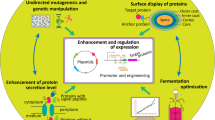Abstract
The first acceleration of protein degradation in cells ofBacillus megaterium was found at the stage 0–I of sporulation, the second one at the stage II–III, where the sporulation process became irreversible. These accelerations were reduced by actinomycin D inhibiting RNA and protein syntheses by more than 95%. In the presence of the antibiotic, only 8% of prelabeled proteins were degraded. Actinomycin D did not lower either the concentration of ATP or the proteolytic activity in the homogenate prepared from sporulating cells. This indicates that the inhibition of protein catabolism by actinomycin D was not owing to the absence of ATP or proteolytic enzymes. Actinomycin probably inhibited an unknown step preceding the proteolytic attack of the protein molecules during sporulation, because it had no significant effect on proteolysis during vegetative growth.
Similar content being viewed by others
Literature Cited
Belitski BR, Shakulov RS (1980) Characteristics of intracellular proteolysis in the cells ofBacillus subtilis. Biokhimiya 45:1788–1796
Bond RW, Switzer RL (1984) Degradation of aspartate transcarbamylase inBacillus subtilis is different inrel mutants but is not mediated by guanosine polyphosphates. J Bacteriol 158:746–748
Burnett TJ, Shankweiler GW, Hageman JH (1986) Activation of intracellular serine proteinase inBacillus subtilis during sporulation. J Bacteriol 165:139–145
Cashel M (1975) Regulation of bacterial ppGpp and pppGpp. Annu Rev Microbiol 29:301–318
Chaloupka J, Strnadová M (1980) Degradation and replenishment of the labile protein fraction in nongrowing cells of the asporogenic mutant ofBacillus megaterium. Folia Microbiol 25:191–200
Chaloupka J, Strnadová M (1982) Kinetics of protein turnover in growing cells ofBacillus megaterium. J Gen Microbiol 128:1003–1008
Chaloupka J, Strnadová M, Zalabák V (1977) Intracellular proteolytic activity during sporulation ofBacillus megaterium. Folia Microbiol 22:1–11
Chaloupka J, Pillai KR, Strnadová M (1980) The complex effect of temperature on protein degradation in sporulatingBacillus megaterium. FEMS Microbiol Lett 9:107–110
Chaloupka J, Severin AJ, Sastry KJ, Kučerová H, Strnadová M (1982) Differences in the regulation of exocellular proteinase synthesis during growth and sporogenesis ofBacillus megaterium. Can J Microbiol 28:1214–1218
Freese EB, Cooney P, Freese E (1975) Conditions controlling commitment of differentiation inBacillus megaterium. Proc Natl Acad Sci USA 72:4037–4041
Goldberg AL, StJohn AC (1976) Intracellular protein degradation in mammalian and bacterial cells; part 2. Annu Rev Biochem 45:747–803
Mandelstam J, Waites WM (1968) Sporulation ofBacillus subtilis. The role of exoprotease. Biochem J 109:793–801
Millet J (1971) Caractérisation d'une endopeptidase cytoplasmique chezBacillus megaterium en voie de sporulation. CR Acad Sci 272:1806–1809
Ochi K, Kandala J, Freese F (1981) Evjdence thatBacillus subtilis sporulation induced by the stringent response is caused by the decrease in GTP or GDP. J Bacteriol 151:1062–1065
Olden K, Goldberg AL (1978) Studies on the energy requirement for intracellular protein degradation inEscherichia coli. Biochim Biophys Acta 542:385–398
Ruppen ME, Switzer RL (1983) Involvement of the stringent response in degradation of glutamine phosphoribosylpyrophosphate amidotransferase inBacillus subtilis. J Bacteriol 155:56–63
StJohn AC, Goldberg AL (1978) Effect of reduced energy production on protein degradation, guanosine tetraphosphate, and RNA synthesis inEscherichia coli. J Biol Chem 253:2705–2711
StJohn AC, Conklin AL, Rosenthal E, Goldberg AL (1978) Further evidence for the involvement of charged tRNA and guanosine tetraphosphate in the control of protein degradation inEscherichia coli. J Biol Chem 253:3945–3951
Stragier P, Bonamy C, Karmazyn-Campelli C (1988) Processing of a stimulated sigma factor inBacillus subtilis: how morphological structure could control gene expression. Cell 52:697–704
Urbá RC (1959) Protein breakdown inBacillus cereus. Biochem J 71:513–518
Váchová L, Strnadová M, Kučerová H, Chaloupka J (1990) Folia Microbiol, in press
Váchová-Philippová L, Chaloupka J (1978) Degradation of proteinsin vivo andin vitro in exocellular proteinase deficient mutants ofBacillus megaterium. FEMS Microbiol Lett 4:117–120
Voelmy R, Goldberg AL (1980) Guanosine-5′-diphosphate-3′-diphosphate (ppGpp) and the regulation of protein breakdown inEscherichia coli. J Biol Chem 255:1008–1014
Author information
Authors and Affiliations
Rights and permissions
About this article
Cite this article
Váchová, L., Kučerová, H. & Chaloupka, J. Protein degradation during sporulation ofBacillus megaterium: Effect of actinomycin D. Current Microbiology 21, 289–293 (1990). https://doi.org/10.1007/BF02092093
Issue Date:
DOI: https://doi.org/10.1007/BF02092093




